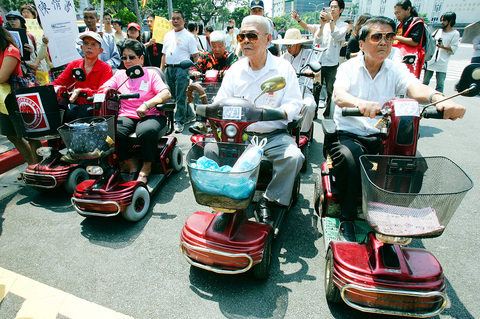An independent legislator yesterday blasted the government over its treatment of relocated leprosy patients from the Happy Life Sanatorium, drawing a defense from a health official.
The criticism follows on the heels of a UN statement on July 20 which said that the eviction of the patients may have violated their internationally recognized rights to health and adequate housing.
Originally built in Sinjhuang (

PHOTO: AP
At a press conference yesterday, legislator May Chin (高金素梅) said, "The abuse of the rights of residents at Happy Life Sanatorium should by no means be considered a less important issue than that of the Thai laborers," referring to controversy over mistreatment of foreign laborers after a group of them rioted in Kaohsiung last month.
Chin added that if the matter was not dealt with effectively by health officials and the central government, "it would strongly affect how the world views Taiwan, a country that claims to respect human rights, democracy and liberty."
Chin said that NT $1 billion (US$30 million) of taxpayers' money had been spent building new accommodations for the patients. However, Chin said, the provisions at the new location at Hui-long Hospital were far from sufficient for their needs.
"Do you think placing patients who have problems with all four limbs on the 4th floor, which they can only get to by scootering across the grounds and cramming themselves into lifts, is seeing to their needs?" Chin asked Deputy Health Minister Chen Tsai-Chin (陳再晉), who was also present at the press conference.
Chin suggested the new accommodations were built to serve the needs of Hui-Long hospital saying that, "If they were built for leprosy patients they would be bungalows in natural surroundings."
Although Chen insisted that Happy Life Sanatorium was separate from Hui-long Hospital, pictures were shown of medical prescriptions with "Hui-long Hospital" clearly printed on it. When asked why the new accommodation's name was so important, a member of the Youth Happy Life Sanatorium Society said that "it was related to what purposes the funds meant for the new housing were being used for."
Asked why the Happy Life Sanatorium was now commonly being referred to as Hui-long hospital, Chen said that he didn't have to explain "what didn't exist."
During the press conference, Chin also raised the question of why patients didn't receive the entire NT$12,750 that the government gives to the leprosy patients each month, but rather received only NT$7,750.
Chen stressed that, "It was not a matter of them not receiving the whole sum but a matter of health officials only being allowed to give out NT$7,750."

Alain Robert, known as the "French Spider-Man," praised Alex Honnold as exceptionally well-prepared after the US climber completed a free solo ascent of Taipei 101 yesterday. Robert said Honnold's ascent of the 508m-tall skyscraper in just more than one-and-a-half hours without using safety ropes or equipment was a remarkable achievement. "This is my life," he said in an interview conducted in French, adding that he liked the feeling of being "on the edge of danger." The 63-year-old Frenchman climbed Taipei 101 using ropes in December 2004, taking about four hours to reach the top. On a one-to-10 scale of difficulty, Robert said Taipei 101

Taiwanese and US defense groups are collaborating to introduce deployable, semi-autonomous manufacturing systems for drones and components in a boost to the nation’s supply chain resilience. Taiwan’s G-Tech Optroelectronics Corp subsidiary GTOC and the US’ Aerkomm Inc on Friday announced an agreement with fellow US-based Firestorm Lab to adopt the latter’s xCell, a technology featuring 3D printers fitted in 6.1m container units. The systems enable aerial platforms and parts to be produced in high volumes from dispersed nodes capable of rapid redeployment, to minimize the risk of enemy strikes and to meet field requirements, they said. Firestorm chief technology officer Ian Muceus said

MORE FALL: An investigation into one of Xi’s key cronies, part of a broader ‘anti-corruption’ drive, indicates that he might have a deep distrust in the military, an expert said China’s latest military purge underscores systemic risks in its shift from collective leadership to sole rule under Chinese President Xi Jinping (習近平), and could disrupt its chain of command and military capabilities, a national security official said yesterday. If decisionmaking within the Chinese Communist Party has become “irrational” under one-man rule, the Taiwan Strait and the regional situation must be approached with extreme caution, given unforeseen risks, they added. The anonymous official made the remarks as China’s Central Military Commission Vice Chairman Zhang Youxia (張又俠) and Joint Staff Department Chief of Staff Liu Zhenli (劉振立) were reportedly being investigated for suspected “serious

Nipah virus infection is to be officially listed as a category 5 notifiable infectious disease in Taiwan in March, while clinical treatment guidelines are being formulated, the Centers for Disease Control (CDC) said yesterday. With Nipah infections being reported in other countries and considering its relatively high fatality rate, the centers on Jan. 16 announced that it would be listed as a notifiable infectious disease to bolster the nation’s systematic early warning system and increase public awareness, the CDC said. Bangladesh reported four fatal cases last year in separate districts, with three linked to raw date palm sap consumption, CDC Epidemic Intelligence